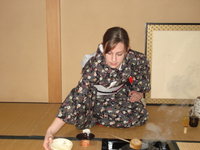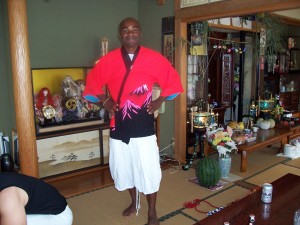Return to Tohoku: JET alum Tanya Gradecky arrives in Japan
Tanya Gardecky (Miyagi-ken, Shiogama-shi) is one of the 20 Tohoku region JET alumni selected by the Ministry of Foreign Affairs (MOFA) to return to their town to both engage in volunteer efforts and also help document and share what’s going on there.
Here’s a quick excerpt from the first post on her travel blog:
“I’m about to head off to the Ministry of Foreign Affairs for a meeting and then I will be on my way to Sendai and Shiogama City in Miyagi Prefecture!!”
JETwit will continue to post updates from Tanya and other participating alums. You can also follow Tanya’s blog at http://www.travelblog.org/Bloggers/ShiogamaJET/.
If you are returning to Tohoku and would like to share your updates, please feel free to e-mail jetwit [at] jetwit.com.
Video: JETAA Ottawa Prez promotes “JETAA dogs” and Japan Festival on morning tv show
***********
JETAA Ottawa President Lisa Mallin (Chiba-ken, 2006-08) does a great job on Ottawa’s Channel A morning show of promoting “JETAA dogs” (Japan-inspired hotdogs) along with the entire Ottawa Japanese Summer Festival. Make sure to watch to the end where Lisa also helpfully informs the host that Sendai-based band Monkey Majik was started by JET alum Maynard Plant (Aomori-ken, 1997-2000) and his brother.
JET Counselor: Roy Huggins (Hokkaido, Sapporo, 2007-10) is a counselor and therapist in both Portland, OR USA (Portland Counseling & Therapy) and Japan (All Japan Counseling) via the magic of Internet chat. He specializes in helping JETs in Japan, international folks and intercultural couples.
 How do you keep upbeat when your boss doesn’t speak English, your significant other is sixteen time zones away, the sweet little kids you work with keep diving at your backside and it takes an hour of driving to find the nearest person who understands all this? It’s a tough puzzle, and one that many JETs struggle with even now. Based on my conversations with JET alumni at the USA national conference last month, JET alumni both urban and rural can empathize even years after returning home.
How do you keep upbeat when your boss doesn’t speak English, your significant other is sixteen time zones away, the sweet little kids you work with keep diving at your backside and it takes an hour of driving to find the nearest person who understands all this? It’s a tough puzzle, and one that many JETs struggle with even now. Based on my conversations with JET alumni at the USA national conference last month, JET alumni both urban and rural can empathize even years after returning home.
Culture shock is a constant for nearly every JET. Beyond that, there’s discrimination (or the appearance of it), isolation, and other vicissitudes of international living. Most of us seem to have a good time anyways, though, or at least remember it all as a good experience.
At the USA national conference I got the chance to talk with the sempai about what worked for them. Going with the assumption that people who were motivated to volunteer for their local JET alumni chapter probably found ways to succeed on JET and value their Japan experiences, I asked everyone I could to tell me what they did to deal with culture shock, discrimination and anything else that came up during their time.
I expected a lot of what I think of as “good luck stories” — stories about Read More
By Rashaad Jorden (Yamagata-ken, 2008-2010) for JQ magazine. Rashaad worked at four elementary schools and three junior high schools on JET, and taught a weekly conversion class in Haguro (his village) to adults. He completed the Tokyo Marathon in 2010, and was also a member of a taiko group in Haguro.
It was the best of times. It was the worst of times.
Those two sentences are a lot more than the beginning of A Tale of Two Cities. The former could best describe my time in the JET Program (with a couple of exceptions), while the latter is an accurate description of my post-JET time.
I was disappointed and sad to leave Yamagata Prefecture last year, but the old saying “when one door closes, another one opens” came to my mind. As much as I enjoyed Japan, I was eager to launch my new life in the U.S.
Since I had talked myself out of grad school for the time being, I figured I ought to put something worthwhile on my resume before commencing the serious job hunt. As my resume included mostly teaching English abroad (France and Japan), I figured I might as well do something related to what I eventually want to do: something editorial related.
Currently, I am seeking an editorial assistant/copy editor/proofreading position. But I would also open to working for cultural exchange programs and in positions that utilize French ability (I am fluent in the language due to having and worked in France).
****************
James Kennedy (Nara-ken, 2004-06), author of the acclaimed young adult novel The Order of Odd-Fish, will be curating the 90-Second Newbery Film Festival with the New York Public Library around November 5 and with the Harold Washington Library in Chicago around November 16. And he has a special request for JET alumni who are into film making:
There are some Newberry award winners that are about Japan and the Japanese, and nobody has done a 90-Second Newbery film of them yet!
Off the top of my head, I can think of:
(1) Heart of a Samurai by Margi Preus, which is about John Manjiro (2011 Honor Winner)
(2) Kira-Kira by Cynthia Kadohata, which is about WWII Japanese-American experience (2005 Medal Winner).
(3) Commodore Perry In the Land of the Shogun by Rhoda Blumberg. (1986 Honor Winner)
So, as for JET alumni:
(1) I’d love to put the call out to the JET alumni community, which surely must include filmmakers, to make 90-second films based on those books for the film festival. (It would be even better if they were totally in Japanese, with subtitles!)
(2) The film festival at the NYPL on November 5 will be not only films, but also live acts between the films — a kind of cabaret atmosphere — live 90-second Newbery reenactments, or songs, etc. So this is also a call out to any arts groups / comedy teams / bands / etc. who would be interested in doing something as a between-film live segment for the 90-Second Newbery film festival?
Here’s a little more info from James about the 90-Second Newbery Festival: Read More



